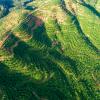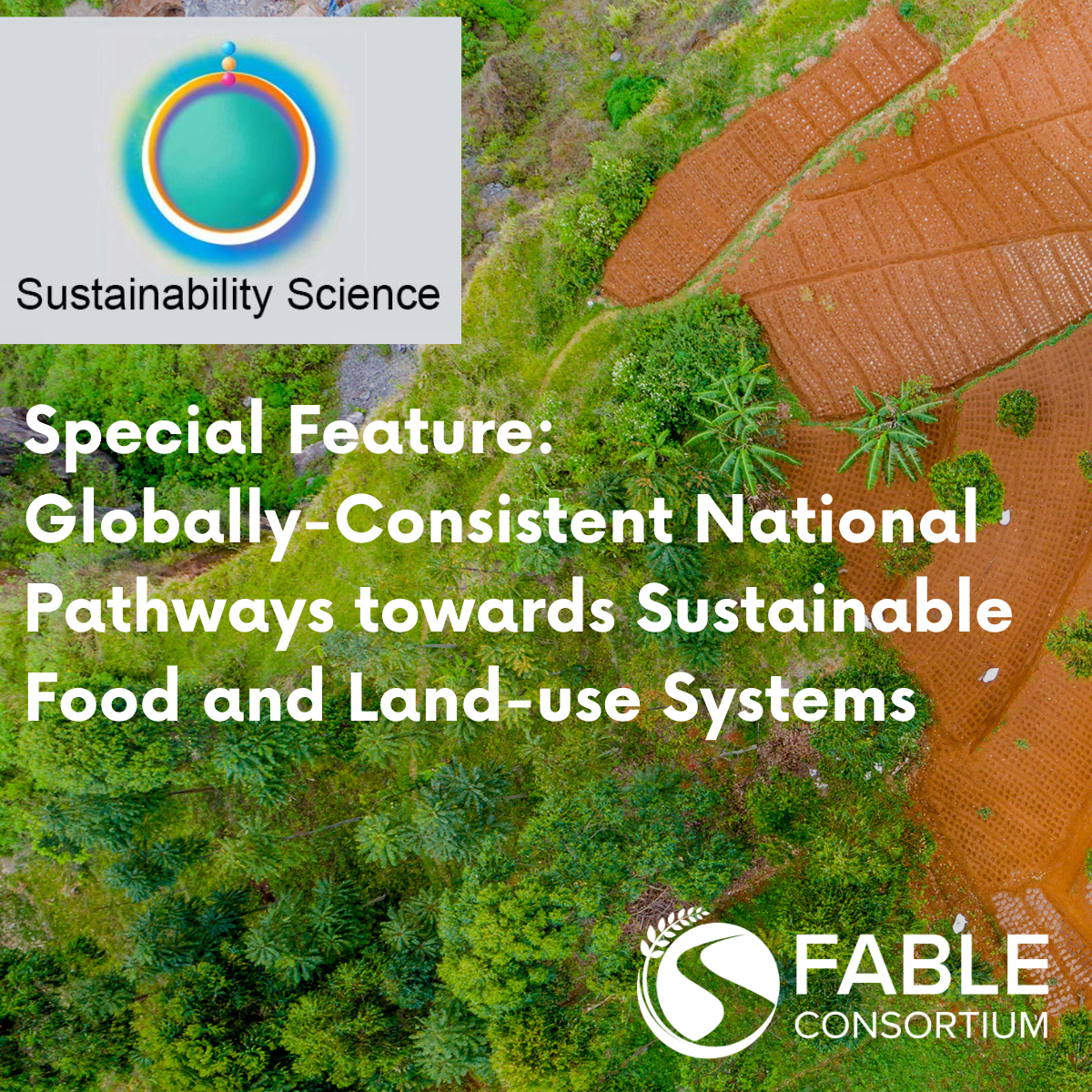
The Food, Agriculture, Biodiversity, Land-Use and Energy (FABLE) Consortium's publication in Sustainability Science collects insights from 20 countries.
FABLE Consortium members from 88 institutes and 20 countries have worked together to produce a FABLE Special Issue, a series of 14 peer-reviewed papers presenting the science and solutions from FABLE’s work to find pathways to sustainable food and land use systems. These pathways focus on conserving and restoring natural ecosystems, shifting diets, improving agricultural productivity, reducing greenhouse gas emissions, and advancing less resource-intensive consumption patterns.
The editorial (Jones et al. 2023) synthesizes findings across the FABLE Special Issue papers. These include an overview of FABLE’s conceptual framework (Mosnier et al. 2022) and identification of sustainable food and land use system pathways in Argentina (Frank et al., 2022), Australia (Navarro Garcia et al., 2022), Sweden (Basnet et al., 2023), Canada (Zerriffi et al., 2022), China (Wang et al., 2022), Finland (Lehtonen et al., 2022), Germany (Rasche et al., 2022), India (Jha et al., 2022, Mexico (González-Abraham et al., 2022), Rwanda (Perez-Guzman et al., 2023, the UK (Smith and Harrison et al., 2022), and USA Wu et al., 2022).
The FABLE Special Issue shows that more ambitious actions are urgently needed to meet national and global sustainability targets on climate, biodiversity, freshwater use, and food security. Under current trends, none of the 12 countries participating in the special issue can reach their sustainability targets.
 © Sustainabiity Science
© Sustainabiity Science
To meet Paris Agreement targets, deforestation must stop, and greenhouse gas emissions from all sectors, including the agriculture, forestry, and land use sector, must fall drastically by 2030. At the same time, meeting the provisional post-2020 global biodiversity goal of halting and reversing biodiversity loss requires a sharp increase in the area of natural ecosystems where biodiversity can thrive, through stronger conservation and restoration actions. Our current food and land use systems are a major source of greenhouse gasses and a root driver of biodiversity loss, while we live in a world where millions of people are not yet food secure and nutrition-related diseases are widespread.
This special issue shows which actions would wholly or partially achieve the unprecedented changes that are required to get food and land use systems on track. FABLE member Sarah Jones (the Alliance of Bioversity International and-CIAT), who led the special issue, explains:
“We see that the same key leverage points are identified in multiple countries, such as shifting diets, improving agricultural productivity, decarbonizing agriculture, and restoring large land areas back to nature. FABLE’s research is showing us that the goal of keeping the planet livable for our children is still within reach with a major, concerted effort. But if we stick to current policies, we will fail.”
Advancing tools for simultaneously achieving food, climate and biodiversity targets
The FABLE Consortium was created to foster cross-sector and cross-country understanding and learning, knowledge sharing, collaborations, and momentum, to strive to achieve our collective vision of a sustainable food and land use system. The collection of papers in the special issue introduces FABLE’s unique participatory, integrated modeling approach and tools.
These tools enable country teams to develop pathways for transitioning to sustainable food and land use that are tailored to local priorities.The papers show how collectively these pathways contribute to global sustainability objectives taking account of implications for international trade in commodities (Figure 1).
 © Mosnier et al. 2022
© Mosnier et al. 2022
Figure 1: FABLE’s modeling approach in a nutshell
The special issue papers each make a unique contribution to advancing food system sustainability knowledge. For example, Rasche et al. (2022) and Smith and Harrison (2022) showcase different ways to elicit and include stakeholders’ feedback into sustainability pathways. Frank et al. (2022), Wang et al. (2022), Navarro Garcia et al. (2022) and Basnet et al. (2023) present methodological advances to extend the reach and policy relevance of FABLE’s food system models. While González-Abraham et al. (2022), Jha et al. (2022), Lehtonen et al. (2022), Perez-Guzman et al. (2023), Zerriffi et al. (2022) and Wu et al. (2022) explore ways to manage country-specific trade-offs and synergies across sustainability objectives.
FABLE member and co-lead on the Special Issue, Adrian Monjeau (CONICET and Fundación Bariloche, Argentina), explains:
"For FABLE work in Argentina, we co-developed with multi-sector national stakeholders scenarios for future food and land use systems. We linked these scenarios with land use allocation tools to provide policymakers with maps showing how to actually implement some of the land use planning options that could help Argentina meet its food security, biodiversity and climate goals."
Taking a different approach, the FABLE Rwanda team used FABLE tools to explore how implementation of Rwanda’s national development plan, Vision 2050, would impact on national sustainability targets. FABLE member and co-lead on the Special Issue, Katya Perez-Guzman (IIASA, Austria) found that in Rwanda, shifting to healthier diets is best when it is compatible with national production of crops that underpin Rwandan livelihoods. However, these crops may not promote the healthy balance of micronutrients that Rwanda citizens need, so it is important to carry out cross-sectoral integrated analysis such as the one included in FABLE’s Special Issue to find the best balance between livelihoods, food security, nutrient intake and sustainability.
Stimulating dialogue for integrated, co-developed solutions
The major actions that are needed to transform food and land use systems will require behavior changes by governments, companies, civil society, communities and individuals. The FABLE special issue provides insights as to how FABLE’s participatory approach can foster cross-sector dialogue, understanding and cooperation, strengthening the foundation for change. This multi-sector stakeholder engagement ensures that the pathways tested are of interest to relevant stakeholders and are thus more likely to be implemented.
For example, FABLE member and co-lead on the Special Issue, Paula Harrison explains that iterative engagement with stakeholders in the UK ensured that the pathways fit well with current government policy and future policy aspirations, maximizing their usefulness to policy development. This dialogue is fostering a step change in policy design where high quality evidence is central to developing integrated solutions for a sustainable future.
Read the articles:
The issue was released as part of Sustainability Science, Volume 18, issue 1. Our new FABLE Special Issue explores these and other findings emerging from FABLE’s work.
This article was first published on the FABLE Consortium website. Read the original article here.
Note: This article gives the views of the author, and not the position of the Nexus blog, nor of the International Institute for Applied Systems Analysis.